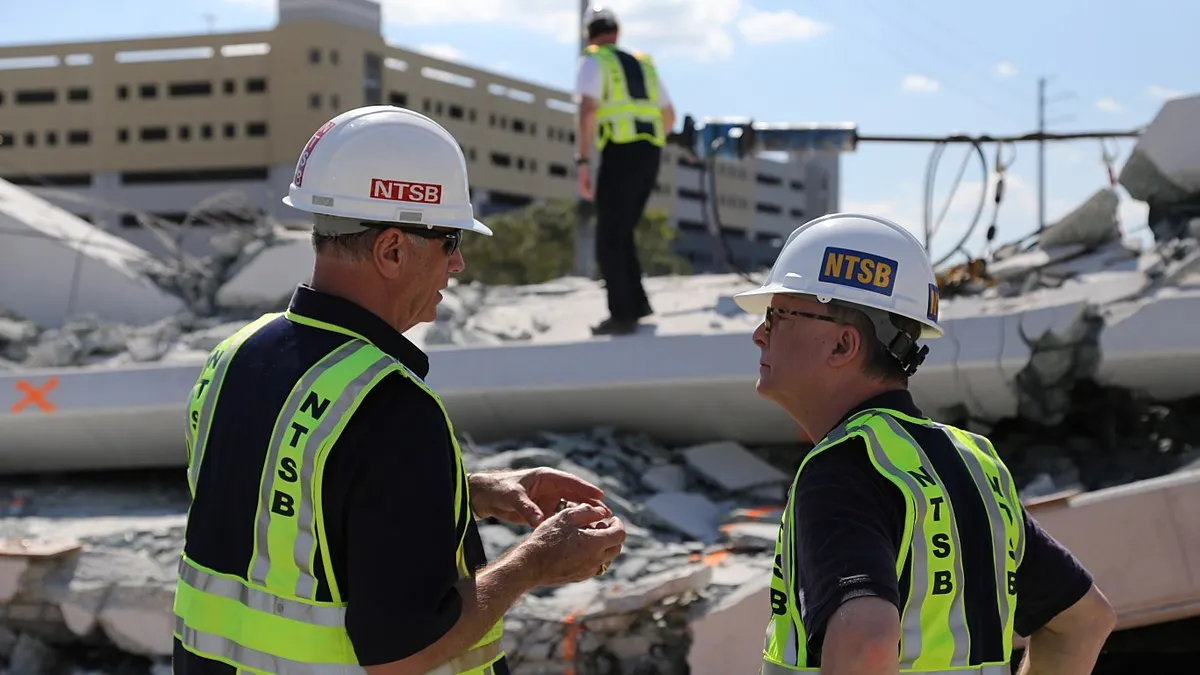UPDATE: May 3, 2019: Magnum Construction Management, the contractor installing the Florida International University pedestrian bridge that collapsed during construction in March 2018, reached a settlement with insurers to pay up to $42 million to victims and their families, The Miami Herald reported Thursday. The agreement, which was filed in bankruptcy court Tuesday, must be approved by a judge. While the National Transportation Safety Board investigation into the cause is still underway, the deal begins to resolve litigation for the six people killed and eight people injured in the incident.
<hr />
The Miami-based contractor that was installing a pedestrian bridge at Florida International University in Miami a year ago when it collapsed has filed for Chapter 11 bankruptcy protection. Magnum Construction Management (MCM), formerly known as Munilla Construction Management, submitted its filing in the Southern District of Florida of U.S. Bankruptcy Court on March 1.
Six people were killed and several others injured on March 15, 2018, when the accelerated bridge construction-built structure fell onto traffic below. The National Transportation Safety Board is still investigating the cause of the accident and has yet to issue a final determination. In its last update in November, the agency said the collapse appeared to have been the result of design errors.
Since the accident, OSHA has cited MCM for allowing employees to work on the bridge after cracks were discovered, along with engineer FIGG Bridge Engineers. Those citations and associated fines, however, are being contested. A photographic representation by the NTSB appears to show that minor cracks appeared at the point of collapse in the days before the failure and then developed into large fissures during or after installation.
Unlike Chapter 7 bankruptcy, through which the filer’s assets are liquidated and then used to pay creditors, Chapter 11 allows the debtor to continue to operate while it works to reorganize and negotiate with creditors. Particularly beneficial to MCM is that there is an automatic stay in effect during bankruptcy proceedings that prevents collection actions and most litigation from moving forward until the case is concluded.
In its filing, MCM said it has between 1,000 and 5,000 employees, assets of between $50 million and $100 million and liabilities of between $10 million and $50 million. The largest unsecured creditor, at more than $4 million, is Core & Main, a supplier of water, sewer, fire protection and storm drain materials. Other construction-related creditors include San Francisco-based engineering firm T.Y. Lin International ($1.7 million); landscape company Unlimited Turf ($1.1 million); and Pennsylvania company Skyline Steel ($800,000). MCM has disputed these amounts.
In a press release, MCM officials said they intend on addressing all claims against the company, and that the Chapter 11 filing "is not an attempt to avoid any responsibility that might be assigned to the company for the collapse of the bridge."
Like many other businesses that wish to reorganize while under bankruptcy protection, MCM has asked the court to permit it to borrow money to pay employees and continue operations. In addition to the personal injury and wrongful death lawsuits it faces related to the collapse, MCM has lost its Florida DOT certifications and approximately $200 million in potential revenue from future projects, according to a case management document it filed with the court. The company added that it has obtained more than $18 million in financing commitments from its sureties so that it can complete bonded projects.
“MCM’s doors are open and the company continues to conduct business as it navigates this process,” said President Jorge Munilla. “The reorganization will have minimal impact on operations.”











